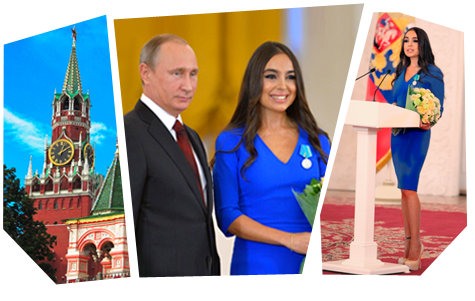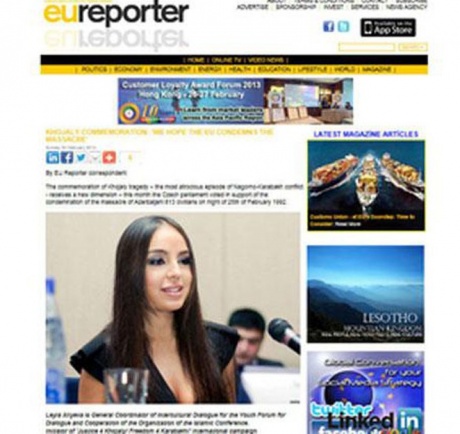
President of the Russian Federation Vladimir Putin presents the “Pushkin” Medal to Leyla Aliyeva

An article about the Khojaly Genocide has been published in the influential analytical European publication 'EU Reporter'.
he article mentions that this month the Parliament of the Czech Republic passed a Resolution condemning the Khojaly Atrocity – one of the bloodiest pages in the history of Armenian-Azeri relations in the Nagorno-Garabagh region. The atrocity took place on the night of 25th-26th February 1992, during which 613 Azeri civilians were murdered. The Czech Republic is the first government of a European Union country to issue such a Resolution.
The article brings attention to the fact that - despite the great number of documents which international organisations have adopted concerning the Amenian-Azeri Nagorno-Garabagh conflict, and the facts of the occupation of territorial areas of Azerbaijan by the Armenian armed forces – the European Union has yet to make its position felt on either the Nagorno-Garabagh conflict or on the Khojaly Atrocity.
The article's author - who cites the words of Azerbaijan's Ambassador in Belgium, and Principle Representative to the EU, Mr Fuad Iskanderov – writes as follows. “It is to be hoped that the European Union will articulate its position more clearly on the Nagorno-Garabagh conflict, and play its part in the resolution of this conflict in its role as a global power.” On the question of the Khojaly Atrocity, the Ambassador went on to say “We cannot take a single step which does not advance future justice for our people. We are waiting for recognition and respect for the memory of the dead of the Khojaly Atrocity. We call upon all nations of the world to share our collective grief.”
Ambassador Iskanderov commented that if mention is made of the gross violation of human rights, then surely the most serious violation must be the violation of the right to life itself? This must necessarily demand unequivocal condemnation. There is no room for double standards on such issues. The Ambassador drew attention to the fact that Brussels, in conjunction with all countries of the world, will play host to events that mark the twenty-first anniversary of the Khojaly Atrocity.
The article points out that the terrible events in Khojaly of 1992 are already acknowledged around the world. In many countries – for example, in the American states of New Mexico, Arkansas, Texas, New Jersey, Georgia and Maine – Resolutions have been passed which condemn the Khojaly Atrocity. The Pakistan Senate has passed a Resolution condemning the illegal occupation of twenty percent of Azerbaijan's territory.
The article goes on to provide information about the 'Justice For Khojaly!' campaign, which is run by the Vice-President of the Heydar Aliyev Foundation, Mrs Leyla Aliyeva. A growing number of countries support this campaign. The article's author mentions that the Proceedings of the Twelfth Annual Summit of the Organisation of Islamic States in Cairo included a call on the world community to recognise the actions of the Armenian military in the town of Khojaly in 1992 as an act of genocide.
In conclusion, the article's author, once again citing the words of Ambassador Iskanderov, says “Very recently the European Union has been awarded the Nobel Peace Prize. Europe had to wait a long time for such recognition. We, too, are members of the family of European nations. We are members of the OSCE, and the Council of Europe. We hope that Europe will, at last, find the will to take steps towards the resolution of these questions.”


